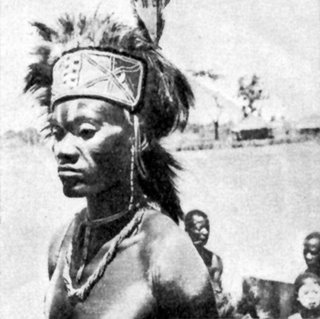Congo
 The kitchen porter or pot cleaner, another regular about 40 years old, was on aviation fuel and permanently out of it. His name was Tommy Kileen, and his brother Gerard had been in the Niemba ambush on the 8th of November 1960, and had been killed and eaten by Baluba tribesmen. Tommy looked quite mad and would pretend he was eating his brother when he was in the kitchen, and would get a knife and fork and go:
The kitchen porter or pot cleaner, another regular about 40 years old, was on aviation fuel and permanently out of it. His name was Tommy Kileen, and his brother Gerard had been in the Niemba ambush on the 8th of November 1960, and had been killed and eaten by Baluba tribesmen. Tommy looked quite mad and would pretend he was eating his brother when he was in the kitchen, and would get a knife and fork and go:“Yum-yum, very nice, very tasty, yum-yum”
He would then go to the soup, and use a ladle, and drink the soup saying that they made soup from his brother. He would often look at me to get reaction, as I was the youngest in the camp and would then start again:
“Brother very nice, yum-yum”.
At the time a patrol led by lieutenant Kevin Gleeson, aged about 22 years, were going through the jungle when they came across a tree blocking their path. It was a small patrol consisting of one officer, one sergeant, two corporals and six men. They stopped and proceeded to remove the tree. To be fair, nothing had happened up to this time, but the moment they saw the tree they should have been suspicious and suspected an ambush. They should have deployed, or better still done a handbrake turn and legged it as fast as possible.
Within seconds they were surrounded by hundreds of fearsome Baluba tribesmen, out of their heads, with spears and bow and arrows. The patrol tried to fight them off, but some of them kept coming towards them even after being hit by bullets. The ambush was unexpected; they were off guard and were hugely outnumbered. They had little firepower: Lee Enfield rifles, Gustaf sub-machine guns with short range, and a Bren gun.
Their fate was sealed, and it was only a matter of time before they were overcome. A young cavalry trooper from the 2nd Motor Squadron, Anthony Brown from Fatima Mansions in Rialto, Dublin, tried to protect his comrades by giving them covering fire to allow them escape. He put his life on the line to protect them. The tribesmen drank his blood because of his bravery and ate him. Anthony Brown was a small, slight guy who used peel the potatoes in the kitchen of Portobello Barracks, Dublin, before he left for the Congo. Himself and 8 others were all slaughtered and only one escaped. His name was '57 Kenny' – he was found a few days later in the bush by another patrol, and he ran towards them, and saluted and shouted: “57 Kenny, sir!”
He had a very bad time when he returned to Ireland, and was branded as a coward by the media. He lived in Cabra West, the same housing estate that ‘Rip it up Rip’ came from, and had serious psychological problems for the rest of his life.
The coffins came back to Dublin on a grey November day in 1960 and thousands of people lined the streets. It was a sad and sombre occasion with the Army Number One band from the same barracks playing the mournful and haunting ‘ Dead march’ from Handel’s ‘Saul’ to the beat of the muffled drums.




2 Comments:
"Branded as a coward by the media," does make for sensenational banner headlines but ignores reality. In hindsight the Irish press could have and should have honoured this man as a National Hero.
fascinating stuff here. stumbled upon you via someone stumbling onto my site, but that would be how the world works best.
Post a Comment
<< Home